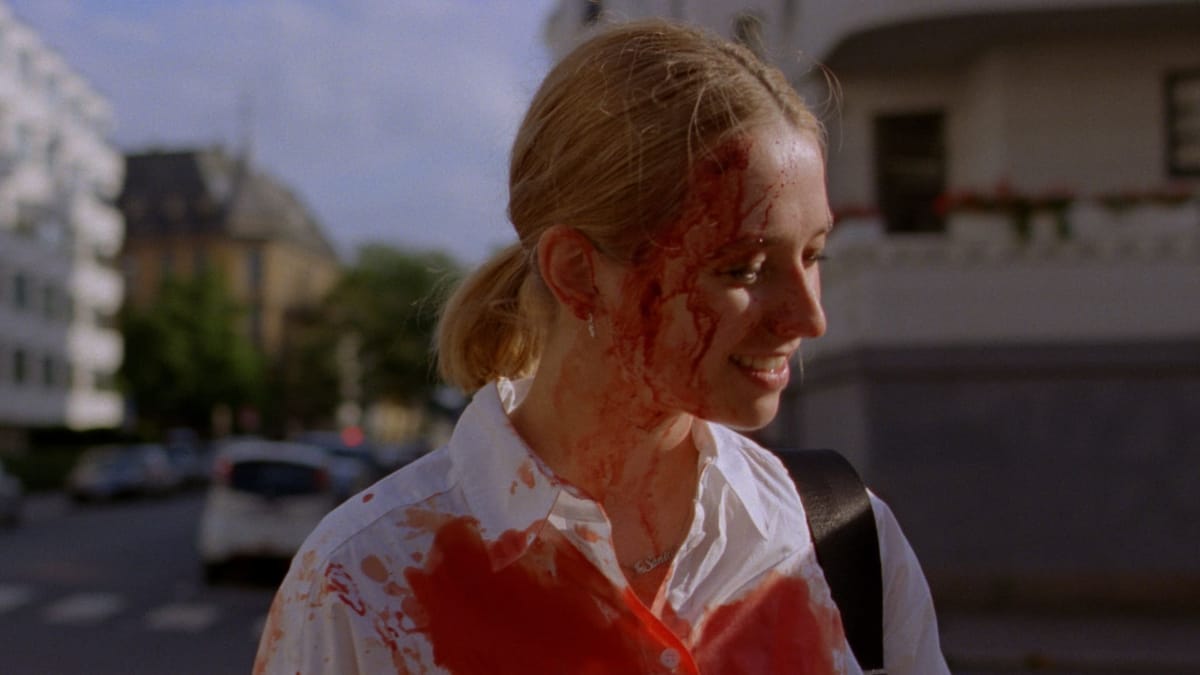Sick of Myself
Every Norwegian film is required by law to include at least one scene with Anders Danielsen Lie.

Signe (Kristine Kujath Thorp) is frustrated. She’s a barista in a little cafe, with seemingly few ambitions. But we know she greatly enjoys attention, as we see in the very first scene when she receives a birthday dessert in a restaurant and excitedly notes that everyone is looking at her. Meanwhile, her boyfriend Thomas (Eirik Sæther) is a rising figure in the local art scene, getting gallery shows and photoshoots and magazine profiles. While she’d likely be unable to celebrate his success, she might be able to bear it, if not for her face being rubbed in it that very evening. She helps him steal a $2300 bottle of wine from a fancy restaurant on the condition they tell everyone she did it (see: desire for attention). But at a party with some friends afterwards, he claims sole responsibility, as she looks on with disdain.
So when a short while later, she falls into helping a woman whose throat was slashed by a dog, she senses an opportunity. The looks she gets as she walks home covered in blood triggers something in Signe. She begins trying to leverage her (minor) role into a news piece by embellishing it while talking to her journalist friend. At the same time, she’s minimizing Thomas’ accomplishments at every turn, such as noting his gallery show is in a small room so even if no one shows it will still look crowded. This causes Thomas to increase his previously established tendency to undermine her, and we’re off to the races, a self-reinforcing and toxic spiral of one-upmanship dominating their relationship. But where he just becomes more insufferable and self-centered, she starts taking more and more extreme actions, starting with faking a nut allergy, and eventually graduating to purchasing Russian pills online specifically for their side effects.
What this movie has to say about the destructive nature of the search for fame is fairly standard in modern media, but what makes it great and notable is the way it says it. This is a perfectly pitched black comedy, where I found myself laughing out loud at so many seemingly subtle moments. The absurdity is turned up to eleven by taking the real phenomenon of Munchausen syndrome and exploring how modern society makes it easier to pull off, even rewarding the behavior. Additionally, whereas actual sufferers feel a compulsion to make themselves sick, Signe appears to be in control of her urges at all times, and simply narcissistic to a truly comical degree. She will do anything to upstage Thomas, including replicating his photoshoot for her own purposes. She tells the same stories multiple times, each time adding some embellishment to make her part more impressive. And people eat it up, adding fuel to the fire, and impressing on Signe that the best way to get noticed is to engender sympathy from others by any means necessary.
What makes this film even better is her fantasies. Half a dozen times, we see a stark change play out, either someone calling her out on her lies and manipulation, or friends and family expressing their realization that they underappreciated her and how much they need her. There’s no indication at first that we’ve jumped into a dream world, but it quickly becomes apparent as people start being far more direct than they are in real life. Some of these are quite distressing, be it visually or emotionally, and help to really drive the point home.
Part of what works so well is that it’s not just about this woman whose priorities have been warped. It’s also about the damaging toll that toxic relationships take on a person. Importantly, it’s not just jealousy of Thomas’ success that gets to Signe. Shortly before he takes all the credit for stealing the wine is the first time we see either of them undermine the other. Signe is telling a friend that people tell her all the time that she’s naturally funny and should start a podcast, and Thomas immediately calls it into doubt with a simple “Who does?”. So we get the sense this need to tear the other one down likely originated with Thomas, and what we’re witnessing is Signe finally fighting back, albeit in an incredibly extreme way. Their relationship is very unhealthy, to put it lightly, which does call into question why they remain together. And yet, once she gets truly sick, he does seem to be fairly good about taking care of her, something which she eventually admits (albeit not to his face).
It sounds weird to call this movie fun, but I thoroughly enjoyed myself. Granted, I’m also someone who laughs hysterically at American Psycho. Which is to reiterate that this is a black comedy: its subject matter isn’t light, nor is it treated lightly throughout. But it is a satire of modern life, which it achieves through heightened characters and situations which are based in reality. It’s for that reason that it manages to be so funny, because it’s so recognizable, if not relatable. I’ve known people like this, hell I lived with someone who made every conversation about themselves, so it’s simultaneously entertaining and horrifying to think of them going to such insane lengths to achieve their goal. To me, that’s at the core of any black comedy: something which is hilarious on the surface, but if you scratch just a little bit, proves to be a thin layer on top of reality. From its subtly funny opening to its raw final scene, Sick of Myself walks that tight rope excellently.